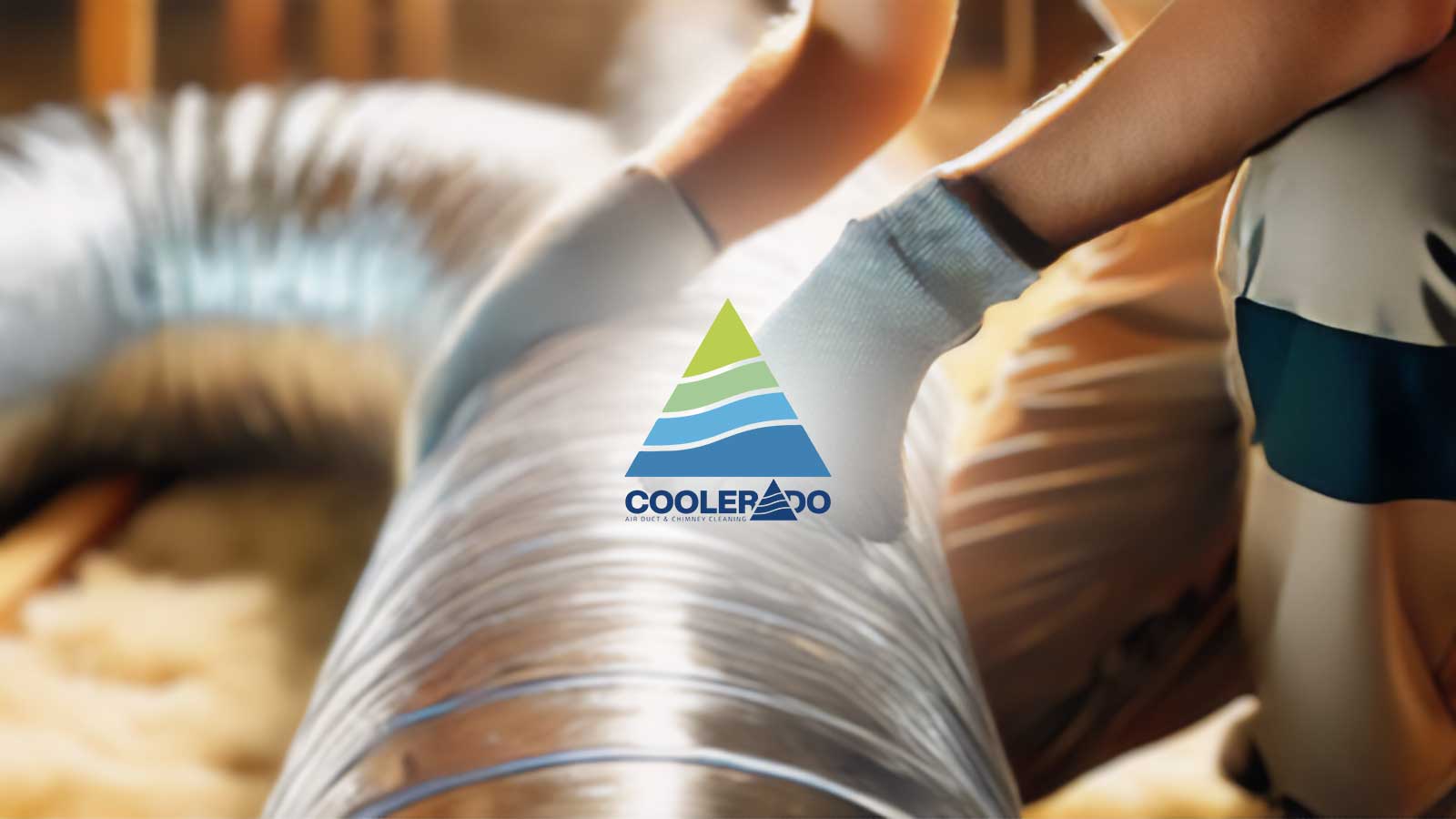 Insulation Installation in Denver: Why It Matters
Insulation Installation in Denver: Why It Matters
Denver, the Mile High City, is known for its high-altitude climate and fluctuating weather patterns, from hot summers to snowy winters. Proper insulation is essential to maximize comfort, energy efficiency, and cost savings for Denver residents. Installing insulation throughout a home ensures that heating and cooling systems work efficiently, maintaining a comfortable indoor environment all year round. This guide covers everything you need to know about insulation install services in Denver, including cost, material types, DIY options, and answers to common questions.
Importance of Insulation in Denver Homes
Denver’s climate ranges from sunny days to chilly winters, with homes in the Mile High City needing consistent, efficient insulation to handle these changes. Proper insulation reduces energy bills, improves indoor air quality, and helps manage heat and cooling flow through walls, ceilings, and floors. Denver residents can enjoy more significant energy savings and increase their property value by insulating their homes.
 Types of Material for Colorado Climate
Types of Material for Colorado Climate
When choosing a material, consider Denver’s climate demands. Standard options include spray foam insulation, fiberglass batts, foam board insulation, and blown-in insulation. Each type of insulation material has pros and cons, depending on the R-value requirements and the location within the home.
Benefits of Proper Insulation
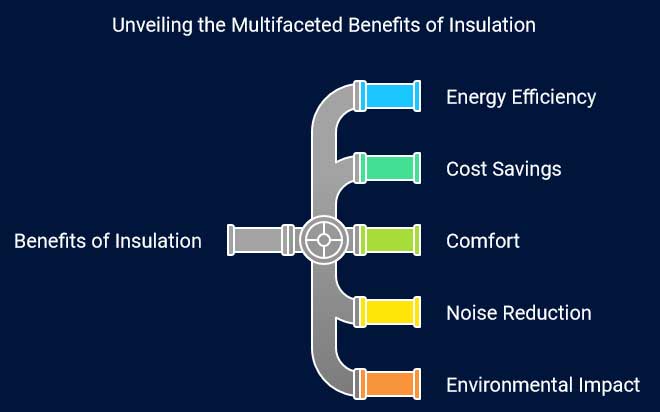
Insulation provides numerous benefits:
- Energy Efficiency: Effective insulation minimizes energy loss, keeping your home warmer in winter and cooler in summer.
- Cost Savings: Reduced heating and cooling bills save money year-round.
- Comfort: Proper insulation controls temperature fluctuations, creating a stable and comfortable living environment.
- Noise Reduction: Quality insulation materials reduce outside noise, improving indoor peace.
- Environmental Impact: Insulation reduces overall energy consumption, lowering a home’s carbon footprint.
Popular Insulation Options in Denver
Spray Insulation
Spray foam insulation is popular in Denver because it expands into tight spaces and seals gaps. It creates a highly effective air barrier and is often used in areas with familiar air leaks, like attics and wall studs.
Blown-In Insulation
Blown-in insulation is applied with specialized equipment that distributes loose cellulose or fiberglass insulation particles across an area, filling wall cavities and hard-to-reach spaces. Due to its excellent coverage and R-value, it’s often used in attic floors and walls.
Batt and Fiberglass Rolls
Batt insulation, commonly made from fiberglass, is cut into pre-measured panels and used in walls, floors, and ceilings. Fiberglass batts are typically installed between studs and are ideal for open spaces with standard dimensions.
 Insulating for Energy Savings
Insulating for Energy Savings
Insulation R-value measures the material’s ability to resist heat flow. In Denver, achieving the correct R-value for each area of the home is essential for energy efficiency. Properly insulating with the recommended R-values for walls, attics, and floors ensures optimal energy savings. Generally, higher R-values are recommended in attics and exterior walls to protect against Denver’s winter cold and summer heat.
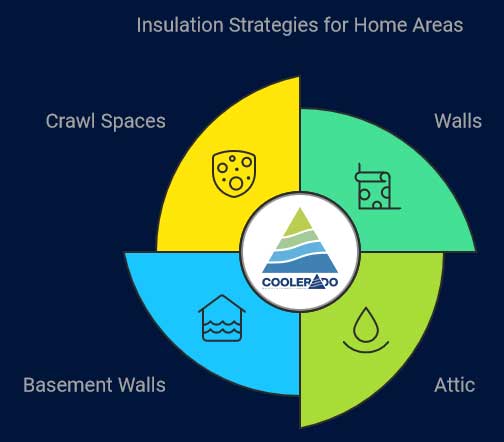
Choosing the Right Insulation Material for Each Area of the Home
Different parts of the home require specific insulation materials:
- Walls: Batt insulation or blown-in is commonly used for walls to provide soundproofing and temperature control.
- Attic: Blown-in or spray foam works well in attic spaces, covering large areas and preventing condensation buildup.
- Basement Walls: In basements, foam board or spray foam insulation provides moisture resistance and temperature control.
- Crawl Spaces: foam can seal hard-to-reach areas in crawl spaces, protecting against moisture and air leaks.
Installation Process for Different Types of Insulation
The installation process varies based on the insulation type and home area. Here’s a breakdown:
- Batt Insulation: Batt insulation requires careful measuring and cutting to fit between wall studs. Faced batts come with an attached vapor barrier, adding an extra layer of protection against moisture.
- Spray Foam: Applied as a liquid, it expands to fill and seal gaps in walls and attics.
- Blown-In: This requires a blown-in machine that pushes fiberglass or cellulose particles into the area, completely covering attic floors or walls.
 Cost Breakdown of Insulation Installation Services
Cost Breakdown of Insulation Installation Services
The cost of installation services varies by material, area of installation, and labor required. Here are the approximate costs for Denver homeowners:
- Batt Insulation: Costs range from $0.50 to $1 per square foot, making it one of the more affordable options.
- Spray Foam Insulation is more expensive, ranging from $1.50 to $3.50 per square foot, but it provides excellent insulation.
- Blown-in: It costs around $1 to $1.80 per square foot, depending on the type of material (fiberglass or cellulose).
- Fiberglass Rolls: Approximately $0.40 to $0.60 per square foot, ideal for DIY projects.
The total cost to install insulation in a 1,000-square-foot area can range from $500 to $3,500, depending on the material and installation complexity.
DIY Insulation Projects vs. Professional Installation
While some DIY enthusiasts may choose to install insulation themselves, professional installation is recommended for larger projects, as it ensures correct installation, compliance with local code, and optimal energy efficiency. Essential safety steps include using a utility knife to cut batts, a staple gun to attach insulation, safety glasses, and a dust mask.

Safety Precautions During Installation
Safety is a priority when installing insulation:
- Wear Safety Equipment: Use safety glasses, dust masks, and gloves to protect against irritation.
- Seal Off Work Areas: Keep the workspace contained to reduce dust spread.
- Ventilate the Area: Proper ventilation prevents inhaling particles and helps reduce dust.
Requirements and Permits in Denver
Denver’s code requires that insulation installations meet specific standards to ensure fire safety, energy efficiency, and moisture control. Proper R-values must be adhered to in exterior walls, basements, and attics. A licensed professional can ensure all insulation work complies with Denver’s codes.
Choosing the Right Insulation Service Provider
When selecting an insulation provider in Denver, consider their experience with local building types and materials. Look for companies that offer free consultations, use high-quality materials like fiberglass and foam, and understand Denver’s climate demands.
 Frequently Asked Questions
Frequently Asked Questions
Q: What is the cost of installing insulation?
A: The cost to install insulation in Denver varies by material and area size, typically ranging from $500 to $3,500 for 1,000 square feet.
Q: Can you install insulation yourself?
A: Yes, DIY installation is possible for certain types, such as fiberglass rolls or batts, but professional installation is recommended for optimal results and safety.
Q: How much is 1,000 square feet of insulation?
A: Depending on the material and installation method, the insulation cost for 1,000 square feet can range from $500 for batt insulation to over $3,000 for spray foam insulation.
Q: What should you not do when installing insulation?
A: Avoid compressing insulation, as it reduces effectiveness. Do not leave gaps or fail to install a vapor barrier where needed, as this can cause moisture problems.
Q: What is Denver most known for?
A: Denver is known for its stunning mountain views, outdoor lifestyle, and iconic sites like the Brown Palace Hotel.
Q: Is Denver cheap or expensive?
A: Denver is generally more expensive than the national average, but energy-efficient insulation can help homeowners save on utility bills.
Q: Why is Denver so famous?
A: Denver is famous for its vibrant culture, outdoor recreational options, and thriving economy.
Q: Is Denver a nice place to live?
A: Yes, Denver offers an excellent quality of life, with beautiful scenery, a range of events, and a variety of housing options to suit different lifestyles.
Q: How much does it cost to insulate 1,000 square feet?
A: The cost of insulating a 1,000-square-foot area ranges from approximately $500 for fiberglass rolls to $3,500 for spray insulation, depending on the material and installation complexity.
Q: Can you install insulation yourself?
A: Homeowners can tackle small DIY projects like installing fiberglass batts or rolls. However, professional installation for spray foam and complex areas is recommended to ensure adequate sealing and compliance with local codes.
Q: What are the benefits of spray insulation in Denver?
A: Spray provides superior air sealing and high R-value, making it ideal for Denver’s temperature swings. It’s excellent for reducing air leaks and maximizing energy efficiency, especially in attics and walls.
Q: What should you not do when during insulation?
A: Avoid compressing insulation, leaving gaps, or skipping vapor barriers where needed, as these can reduce effectiveness and cause moisture issues.
Q: Why is insulation important for energy savings in Denver?
A: Denver’s variable climate means insulation minimizes heat loss in winter and keeps interiors cool in summer, leading to significant energy savings on heating and cooling bills.
Q: Is Denver an excellent place for energy-conscious homeowners to live?
A: Absolutely! Denver offers a vibrant outdoor culture, beautiful scenery, and a range of energy-efficiency programs to support eco-conscious living, making it ideal for homeowners focused on sustainability.
Q: What type of insulation is best for interior walls?
A: Fiberglass batts and blown-in work well for interior walls, offering soundproofing and temperature control for added comfort.
Q: Do I need a vapor barrier with my insulation in Denver?
A: Vapor barriers are recommended in areas prone to moisture, like basements and crawl spaces. Proper installation reduces condensation, which can damage insulation and lead to mold growth.
 Types of Insulation Materials Commonly Used in Denver
Types of Insulation Materials Commonly Used in Denver
Insulation is essential for maximizing energy efficiency and comfort in Denver’s varying climate. Here’s a breakdown of popular insulation types and their applications:
Fiberglass Insulation
Fiberglass insulation is widely used for its affordability, ease of installation, and effectiveness. This type comes in batts or roll insulation, making it ideal for wall studs, floor joists, and attic spaces. Fiberglass batts and rolls are also fire-resistant and offer good soundproofing properties, making them a solid choice for Denver homes.
Spray Foam Insulation
Spray insulation expands upon application, filling every nook and cranny to create an airtight seal. This type is particularly effective in insulating against air leaks, making it great for attics, crawl spaces, and basements where drafts may be more prominent. It has a higher R-value than other materials, which means better thermal resistance and potential energy savings.
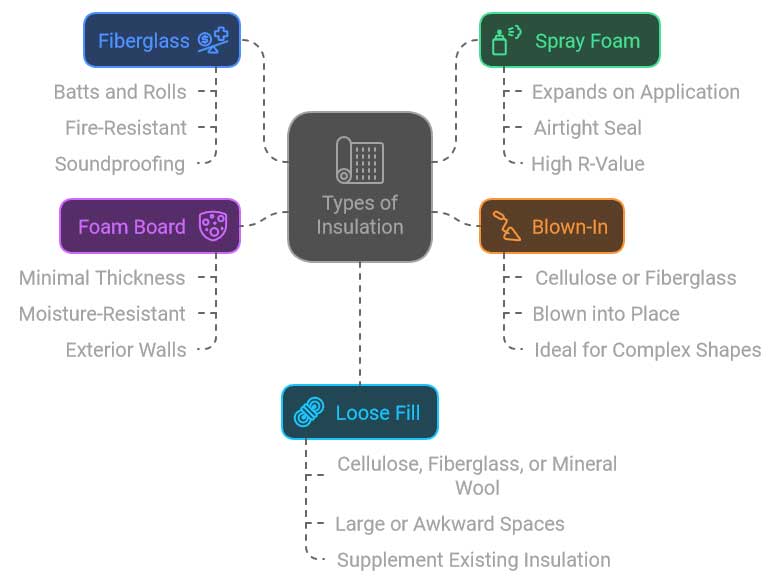
Blown-In Insulation
Blown-in is often made from cellulose or fiberglass and installed by blowing the material into place. This method effectively covers irregular surfaces, making it popular for attics and spaces with complex shapes. Blown-in is ideal for those looking to improve insulation in hard-to-reach areas and areas with existing insulation that needs updating.
Foam Board Insulation
Foam board insulation provides high R-values with minimal thickness, making it ideal for insulating basement walls or areas with limited wall cavity depth. It is also moisture-resistant, making it suitable for use on exterior walls or below-grade foundations in basements.
Loose Fill Insulation
Loose-fill insulation consists of tiny cellulose, fiberglass, or mineral wool particles. Like blown-in insulation, it’s versatile for covering large or awkward spaces. It’s often used in attics and provides solid thermal resistance. Loose-fill’s flexibility makes it perfect for supplementing existing insulation in older Denver homes.
 Insulating Different Areas of the Home: Best Practices
Insulating Different Areas of the Home: Best Practices
Each area of a home requires specific insulation types and installation techniques. Here’s a look at best practices for typical insulation applications:
- Attics: Attics benefit from blown-in or spray foam insulation. Applying insulation here reduces heat loss in winter and keeps the home cooler in summer.
- Walls: Use batt insulation or blown-in to seal gaps and fill wall studs. Interior walls can also be insulated to reduce sound transmission.
- Basements: Foam board or spray is ideal for basement walls, as it helps manage moisture levels and prevent mold.
- Crawl Spaces: Closed-cell spray or foam board insulation effectively seals gaps and adds a vapor barrier, protecting against Denver’s potential for dampness in crawl spaces.
Cost and Efficiency of Insulation by R-Value
R-value measures thermal resistance, with higher values indicating better insulating power. In Denver, achieving optimal R-values is critical for managing heat loss during cold months and maintaining energy efficiency in the summer. The following R-values are typically recommended:
- Attic: R-49 to R-60
- Walls: R-13 to R-21
- Basements and Crawl Spaces: R-11 to R-25
Higher R-values may come with a higher initial cost, but the energy savings in Denver’s variable climate make it a worthwhile investment.
Safety Precautions for Installation
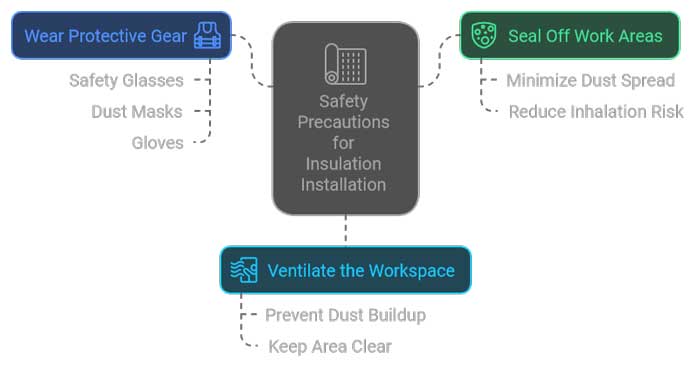
Safety should always be a priority during installation. Here are some essential safety measures:
- Wear Protective Gear: Use safety glasses, dust masks, and gloves to avoid irritation.
- Seal Off Work Areas: This minimizes dust spread and reduces the chance of inhaling insulation particles.
- Ventilate the Workspace: Proper airflow prevents dust buildup and keeps the area clear during installation.
Local Code Compliance and Permits in Denver
Denver’s code requires adherence to specific insulation standards to ensure safety, fire resistance, and energy efficiency. Following the code ensures that insulation is installed safely and effectively, particularly in areas with unique requirements, like downtown Denver. Always consult a licensed contractor to ensure all work meets Denver’s building codes.
Tools and Equipment Needed for Insulation Installation
Insulation requires specific tools to achieve a proper installation:
- Utility Knife: Essential for cutting batts and foam board to fit precisely within wall studs or floor joists.
- Staple Gun: Often used to attach faced batts and ensure they stay in place.
- Measuring Tape: Accurate measurements help determine the needed square foot coverage.
- Safety Gear: Always wear safety glasses and dust masks for protection from insulation particles.
 Questions to Ask Before Hiring an Insulation Contractor
Questions to Ask Before Hiring an Insulation Contractor
Before hiring a professional insulation contractor, it’s essential to ask a few key questions:
- What insulation types do you recommend for my home’s specific needs?
- Do you follow Denver’s local insulation codes and standards?
- What kind of R-value should I aim for in each area of my home?
- Can you provide an estimate based on square footage and material type?
Selecting a contractor familiar with Denver’s unique climate and housing structures ensures that the job will be done efficiently and correctly.
Insulation Installation Costs in Denver, CO
When budgeting for insulation installation in Denver, several factors include material type, installation location, and labor expenses. Here’s a breakdown of average costs and what to expect.
Standard Insulation Installation Costs
For ductwork insulation and HVAC system insulation, homeowners in Denver can anticipate a price range of $1,000 to $2,700. Most projects average around $2,500 for typical home sizes, and per-square-foot costs generally fall between $1 and $8, depending on the thickness and type of insulation used. This range allows for flexibility based on project needs and R-value requirements.
Material Costs by Type
The cost of insulation material varies significantly by type:
- Fiberglass Insulation: Flexible fiberglass runs around $1 to $4 per square foot, while rigid or foam board fiberglass costs between $4 and $8 per square foot. Fiberglass is a versatile option that works well for walls, floors, and ceiling joists and is highly effective for both summer cooling and winter heating.
- Mineral Wool Insulation: Known for its soundproofing and fire-resistant qualities, mineral wool costs between $2 and $4 per square foot. Its dense structure makes it ideal for studs and other areas that need added durability against air leaks and gaps.
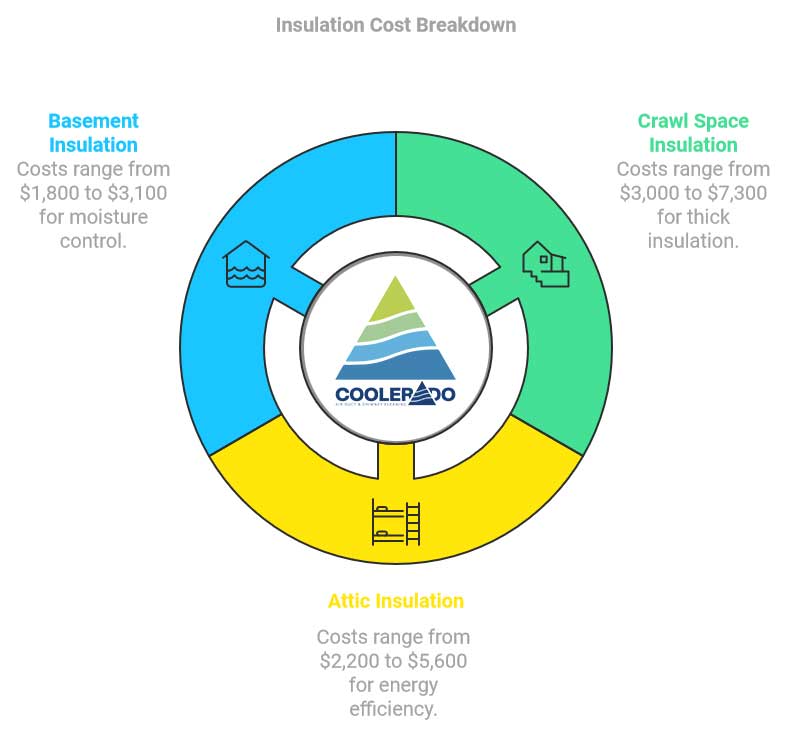
Installation Costs by Location
Where insulation is installed within the home also impacts the final cost. Here’s a closer look:
- Crawl Space Insulation: The average cost ranges from $3,000 to $7,300. Crawl spaces require thick insulation to prevent heat loss and manage moisture control, so the labor-intensive process may increase overall expenses.
- Attic Insulation: Attic insulation costs generally range from $2,200 to $5,600. Attics are notorious for temperature fluctuations, making effective insulation vital for energy efficiency throughout the home.
- Basement Insulation: Insulating a basement typically costs between $1,800 and $3,100. Due to potential mold and condensation issues, basement walls and floors require materials that prevent moisture buildup and protect against Denver’s winter temperatures.
Labor Costs for Professional Installation
Labor is essential to insulation costs, especially for larger, complex installations. Professional insulation installers in Denver charge $45 to $80 per hour, with per-square-foot labor costs ranging from $0.25 to $2.50. These rates can vary depending on the type of insulation and accessibility of the installation area, with more intricate projects, like insulating around pipes, vents, and wires, requiring additional expertise.
Additional Services
Some homes may need extra services to ensure optimal insulation:
- Duct Sealing: Sealing gaps and cracks in ductwork can significantly enhance energy efficiency. Manual sealing costs between $400 and $1,900, while aerosol sealing ranges from $1,300 to $2,700. By sealing ducts, homeowners can prevent air leaks that impact heating and cooling performance.
- Old Insulation Removal: For homes with asbestos or damaged insulation, removal is essential before new material is installed. This added step can increase costs but is necessary for safe and effective installation.
Installation Timeline and Efficiency Benefits
The timeline for insulation projects depends on home size, access, and material type. Smaller projects may take only a few hours, while more extensive or complex installations can span 2+ days. Properly insulating attics, floors, and walls can increase HVAC efficiency by 10-40%, providing air and energy savings that reduce monthly utility bills and improve indoor air quality.
Considerations for Insulation Installation in Denver
Given Denver’s unique climate, homeowners should pay special attention to ensuring each area—particularly attics, crawl spaces, and basements—is thoroughly insulated. This means selecting the proper R-value, caulking gaps to prevent drafts, and inspecting each wall cavity for cracks. Ensuring adequate insulation around floor joists and wall studs will also keep homes warm in winter and cool in summer, enhancing comfort throughout Denver’s neighborhoods.
 Conclusion: Insulating Denver Homes for Maximum Comfort and Savings
Conclusion: Insulating Denver Homes for Maximum Comfort and Savings
With Denver’s diverse climate and elevation, insulating your home is essential for comfort, energy efficiency, and property value. Selecting the suitable insulation material, such as fiberglass, spray foam, or blown-in, tailored to each home area will maximize R-value and savings.
Whether you’re looking to insulate walls, floors, basements, or attics, understanding the types of insulation available and the costs involved can make a significant difference. Choosing a knowledgeable, licensed contractor who understands Denver’s building codes and insulation needs is critical to achieving a properly insulated, efficient, and cozy home. For Denver residents, insulation is more than just a construction material; it invests in comfort, sustainability, and quality of life.

